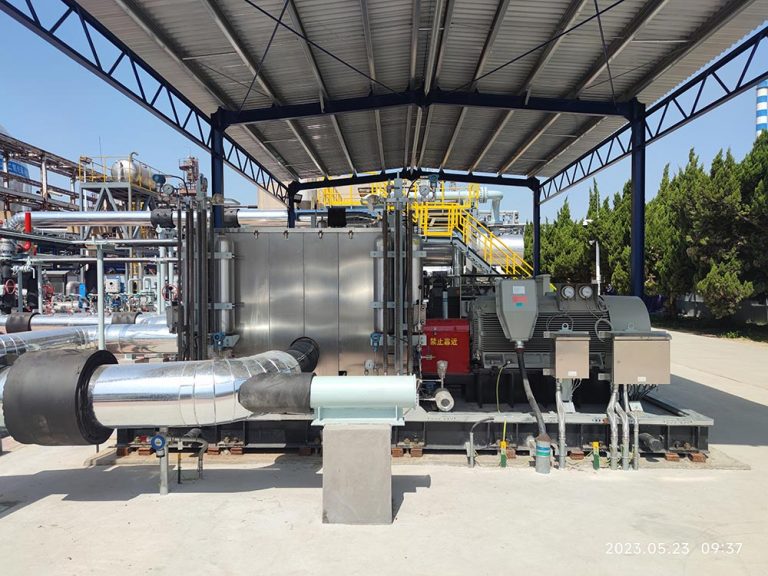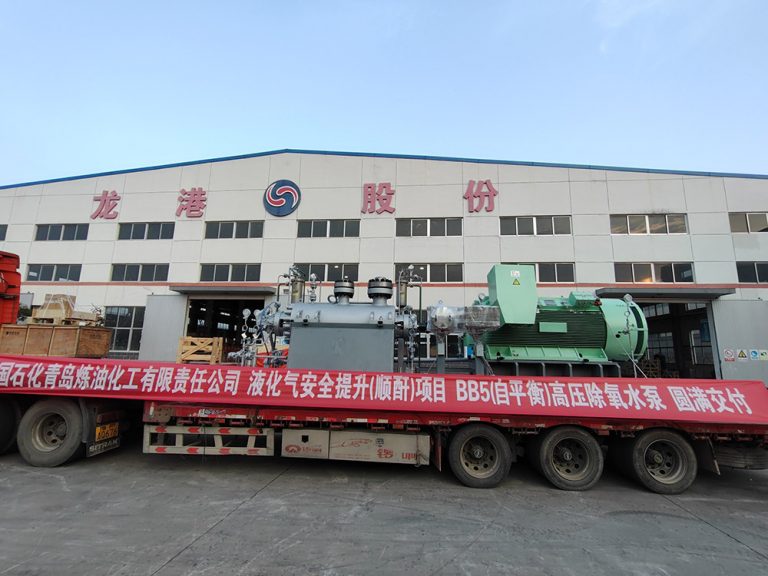Fluid viscosity refers to a fluid’s resistance to flow. In the oil and gas industry, this property is crucial as it determines how easily fluids can be transported through pipelines and processed. Viscosity affects the energy required to move fluids, influencing overall operational efficiency.

The Impact of Viscosity on Pump Performance
Viscosity directly impacts centrifugal pump performance by affecting flow rates and energy consumption. High-viscosity fluids require more energy to pump, potentially leading to increased wear on pump components. This can result in higher maintenance costs and reduced lifespan of the equipment. Therefore, selecting pumps that can handle specific viscosity levels is essential for optimal performance.
How Do Centrifugal Pumps Operate in the Oil and Gas Industry?
Overview of Centrifugal Pump Functionality
Centrifugal pumps are widely used in the oil and gas sector due to their ability to handle large volumes of fluid efficiently. These pumps work by converting rotational kinetic energy into hydrodynamic energy, propelling fluids through a system. Their design allows for consistent pressure output, making them suitable for various applications, including transporting crude oil and natural gas.
Yantai Longgang Pump Industry’s Contribution to Pump Technology
Yantai Longgang Pump Industry has made significant advancements in centrifugal pump technology. Their products are designed to handle high-temperature, high-pressure, and corrosive media, ensuring reliability even in challenging environments. The company’s Services offer tailored solutions for specific industry needs, enhancing pump performance and longevity.、

In conclusion, understanding fluid viscosity’s role in centrifugal pump applications is vital for efficient operations in the oil and gas industry. By considering viscosity during pump selection and leveraging advanced technologies from leaders like Yantai Longgang Pump Industry, you can optimize your processes and reduce operational costs.
Why is Viscosity a Critical Factor in Selecting Centrifugal Pumps?
Selecting the Right Pump for Viscous Fluids
When dealing with viscous fluids, selecting the appropriate centrifugal pump is crucial. The viscosity of a fluid determines the type of pump needed to efficiently move it through a system. High-viscosity fluids require pumps designed to handle increased resistance and pressure. This often involves choosing pumps with specialized impellers or additional stages to maintain efficiency and prevent excessive wear.
Services for Optimizing Pump Selection
Tailoring pump selection to match fluid viscosity can significantly enhance performance and reduce energy consumption. Companies like Yantai Longgang Pump Industry provide comprehensive Services that assist in optimizing pump choices for specific applications. These services include detailed analyses of fluid properties, ensuring that the selected pumps meet operational demands while minimizing maintenance requirements.
How Does Fluid Viscosity Affect Energy Consumption in Pumps?
Energy Efficiency Considerations
Fluid viscosity plays a pivotal role in determining the energy efficiency of centrifugal pumps. High-viscosity fluids demand more energy to move, which can increase operational costs. To mitigate this, it’s essential to select pumps that are specifically engineered for high-viscosity applications. This includes utilizing advanced impeller designs and materials that minimize friction and energy loss.
Innovations to Improve Energy Efficiency
Recent innovations have focused on improving the energy efficiency of centrifugal pumps handling viscous fluids. These advancements include the development of variable speed drives and enhanced impeller geometries that adapt to changing fluid dynamics. By integrating these technologies, you can achieve significant reductions in energy consumption, leading to cost savings and improved sustainability in oil and gas operations.
In summary, fluid viscosity is a critical factor influencing centrifugal pump applications in oil and gas industries. By carefully selecting pumps suited for specific viscosities and leveraging innovative technologies, you can optimize performance, reduce energy consumption, and extend equipment lifespan.
Can High Viscosity Fluids Cause Wear and Tear on Pumps?
Understanding Wear Mechanisms
High viscosity fluids can indeed contribute to wear and tear on centrifugal pumps. These fluids exert increased resistance against the pump’s components, leading to elevated friction levels. Over time, this friction can degrade the pump’s internal parts, such as impellers and seals. The abrasive nature of some viscous fluids can further exacerbate wear by causing scratches or grooves in the pump surfaces, which may lead to leaks or reduced efficiency. Therefore, understanding the wear mechanisms associated with high-viscosity fluids is crucial for maintaining pump integrity and performance.
Maintenance Practices to Extend Pump Lifespan
To mitigate the effects of high viscosity on pump longevity, implementing robust maintenance practices is essential. Regular inspections and timely replacements of worn components can prevent catastrophic failures. Employing advanced materials that resist abrasion and corrosion can also enhance durability. Additionally, optimizing operational parameters such as flow rate and pressure settings can minimize unnecessary stress on the pump system.
Proper lubrication is another critical factor in extending pump lifespan. Ensuring that bearings are adequately lubricated reduces friction and heat generation, which are common contributors to wear. Utilizing condition monitoring technologies, like vibration analysis and thermal imaging, allows for early detection of potential issues before they escalate into major problems.
Incorporating these maintenance strategies not only prolongs the service life of centrifugal pumps but also ensures consistent performance in demanding oil and gas applications. By addressing the challenges posed by high-viscosity fluids through preventive measures, you can maintain efficient operations and reduce downtime in your pumping systems.
In conclusion, while high viscosity fluids present challenges for centrifugal pumps, understanding their impact on wear mechanisms and adopting effective maintenance practices can significantly mitigate these effects. By doing so, you ensure reliable operation and longevity of your pumping equipment in oil and gas environments.
What Are the Solutions for Managing High Viscosity Fluids?
Enhancing Pump Design for Viscous Applications
When dealing with high viscosity fluids, optimizing pump design is essential to ensure efficient operation. This involves tailoring the pump’s components, such as impellers and casings, to handle increased resistance and pressure. Utilizing a double volute structure can reduce radial forces, decrease shaft loads, and extend bearing life, making it ideal for high-viscosity applications. Additionally, incorporating an inducer wheel structure at the impeller inlet can improve suction performance under strict cavitation conditions.
For high-viscosity environments, selecting pumps with a multi-stage centrifugal design can enhance performance by distributing workload across multiple stages. This design helps maintain efficiency and reduces wear on individual components. Yantai Longgang Pump Industry offers advanced pump designs that cater to these specific needs, ensuring reliability even in challenging conditions.
Implementing Advanced Monitoring Systems
Advanced monitoring systems play a crucial role in managing high viscosity fluids in centrifugal pumps. These systems provide real-time data on pump performance, allowing for proactive maintenance and timely interventions. By employing technologies like vibration analysis and thermal imaging, you can detect potential issues before they lead to significant damage or downtime.
Integrating smart sensors into the pump system enables continuous monitoring of parameters such as flow rate, pressure, and temperature. This data-driven approach allows for precise adjustments to operational settings, optimizing performance while minimizing energy consumption. Moreover, these systems can alert operators to any deviations from normal operating conditions, facilitating prompt corrective actions.
Services provided by companies like Yantai Longgang Pump Industry include implementing customized monitoring solutions that enhance pump reliability and efficiency. By leveraging these services, you can achieve better control over your pumping processes and extend the lifespan of your equipment.
In conclusion, managing high viscosity fluids in centrifugal pumps requires a combination of enhanced design features and advanced monitoring systems. By adopting these solutions, you can optimize pump performance, reduce wear and tear, and ensure efficient operations in oil and gas applications.
How Do External Factors Influence the Impact of Viscosity on Pumps?
Environmental Conditions Affecting Viscosity
Environmental conditions play a significant role in affecting fluid viscosity, which in turn impacts centrifugal pump performance. Temperature fluctuations can alter the viscosity of fluids, either increasing or decreasing their resistance to flow. For instance, colder temperatures typically increase viscosity, making fluids thicker and more challenging to pump. Conversely, higher temperatures can decrease viscosity, leading to easier flow but potentially causing issues like cavitation.
In oil and gas operations, environmental factors such as ambient temperature, humidity, and altitude must be considered when selecting and operating pumps. These factors can influence the efficiency and reliability of pumping systems by altering fluid properties. Therefore, it is crucial to implement strategies that account for these variations to maintain optimal pump performance.
Adapting to Fluctuating Field Conditions
Adapting to fluctuating field conditions is essential for managing the impact of viscosity on centrifugal pumps. This involves utilizing pumps with adjustable features that can accommodate changes in fluid dynamics. Variable speed drives are an effective solution, allowing operators to adjust pump speed according to real-time viscosity changes. This adaptability helps maintain consistent flow rates and reduces energy consumption.
Additionally, employing advanced materials and coatings on pump components can enhance resistance to wear caused by varying viscosities. These materials are designed to withstand the stresses associated with different environmental conditions, ensuring durability and longevity.
By leveraging innovative technologies and adaptive solutions, you can effectively manage the challenges posed by fluctuating field conditions on fluid viscosity. This proactive approach not only enhances pump efficiency but also minimizes operational disruptions in oil and gas applications.
In conclusion, external factors such as environmental conditions significantly influence the impact of fluid viscosity on centrifugal pumps. By understanding these influences and implementing adaptive strategies, you can optimize pump performance and ensure reliable operations in diverse field environments.








